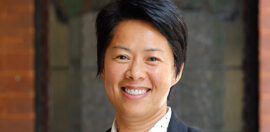On a Mission in Kings Cross
8 December 2014 at 10:30 am
As the Pastor and CEO at the Wayside Chapel in Sydney’s Kings Cross, Reverend Graham Long has spent his life making connections with other people. Rev Long is this week’s Changemaker.
 Rev Graham Long has been in charge of the Wayside Chapel in Kings Cross for the past 10 years.
Rev Graham Long has been in charge of the Wayside Chapel in Kings Cross for the past 10 years.
In that time he says he has seen the best and worst parts of society come together.
He claims that he himself was written off at an early age and credits a passionate teacher and the homeless people he works with for saving his life on more than one occasion.
What are you currently working on at Wayside Chapel?
Well we’re doing lots of things. It’s a fairly big question in a way.
When I arrived we had two staff only and now we’ve got 50, so it’s been a strong growth rate.
All of our funding is private, so we’ve had no growth in Government funding, but we’ve had a massive growth in private funding.
So that says a lot of things. The upside is that we don’t have Government breathing down our necks very often but the downside is trying to budget based on how generous the public might be next year. It’s a little bit like crystal ball gazing.
We’re doing a lot of cutting-edge interesting stuff. The Government funding we do have comes to about 15 per cent of our budget, and all of that 15 per cent is currently under threat.
So what I’m working on at the moment is strategising about what we can do to try and keep that 15 per cent because working 15 per cent harder is a big ask. It’s a big ask.
If we can’t secure that 15 per cent we don’t have the fat to carry it so it means some services will close.
But the overall picture is really interesting and we’re doing some very interesting and unique kind of things. We’ve got a space for Aboriginal people, which is the only space in Kings Cross and the blumin’ thing’s just flourishing. We’re really kicking goals that are rarely kicked.
We have built a new building. In addition to all those new staff, we had a building that was almost falling down when I arrived. Really, that’s not a metaphor. Because of our roof, when it rained we used to have water views, but not the kind you would pay for.
So our existence was very seriously under discussion and so we started a building program with no money at all and we finished it with no debt, so we did really well.
That was quite an achievement. I wouldn’t like to live through it again, but it was definitely an achievement. In fact if you told me you had a building program I would probably run the other way as fast as I could.
Why is your Government funding under threat?
Well actually we have a bit of funding for a program called Day to Day Living which is scheduled and I believe that’s not under immediate threat.
We get some State Government funding, which goes towards running our youth service and also what we call our community service, which is really everything that walks off the street into our front door, we used to call it a crisis centre but it’s basically everything that you can imagine that walks in off Kings Cross into our place.
It’s only $100,000 that they put into that particular service and into youth I think they put in $120,000, and of course that pays for next to nothing and we run that service seven days a week, and it’s fully staffed. But if you take $220,000 out and we don’t have the fat to cover it, it’s a very, very costly exercise for us potentially.
Kings Cross is a fairly notorious area. What’s like to work out of there?
Well it’s an interesting spot for sure. Kings Cross has gentrified in the last 10 years and the very, very wealthy and the very, very poor live side-by-side. It’s a very interesting place to be and we try to connect with both.
We tell the poor that we wouldn’t be here without the wealthy because they’re the one’s funding this project. And we say to the wealthy “this is your brother, this is your sister” rather than “here’s an interesting case”.
That sort of really enriches who we are at both ends. I must say that the wealthy people in Kings Cross are mostly pretty tolerant of the poor and they think they have a right to be here.
It’s a pretty good community.
Kings Cross gets some very bad press because of king hits and drugs and all of that but while Kings Cross does get feral on Friday and Saturday nights, it’s mostly because of people from the suburbs who get tanked before they get here and their aim is to get feral and that’s exactly what happens. You’ll see humanity at its worst.
But you know, there’s another whole story and I think we live in a really good community.
Could you see Wayside Chapel working out of any other community or is Kings Cross where you’d like to stay?
I think our strength is we know who we are, we know what we do. That is a real strength.
I think you could take our mission and transplant it into another place and that mission would probably look a little bit different to what it looks like in Kings Cross.
But yeah, I think it could move to other places. People often suggest to me that we should sort of franchise but I know how much work that would be so I sort of shy away from it a bit. But it may happen one day.
What was it that drew you to the Not for Profit sector?
It’s the only place I’ve ever worked so I don’t know anything about the other world. I have a lot of friends who work for profit and without them we wouldn’t be able to do what we do.
I was a social worker in my first life and then I came to the ministry and in a way this brings the two halves of my life together. I’m a good fit for the place and it’s a good fit for me.
What’s the most rewarding part of what you do?
Well I love our mission. Our mission is to create community with no us and them, in other words it isn’t to run strictly as defined by the word charity. It’s our mission to create community.
We say if people walk away feeling met rather than worked on then they’ve had a very good day.
We often see our mission unfold before our eyes and that’s what I love. I love it when the distinctions between rich and poor, housed and homeless, sick and well, saved and lost, when all of that melts away and it’s just us, that’s when we really hit it.
What’s the most challenging part of the work you do?
Well funding’s one of them. That’s a big one because it never stops. Funding Wayside’s like trying to keep a steam train moving where you’re shovelling money into the furnace.
But I think the other challenge is a lot of people who are poor and used to being dealt with are resistant to our mission in a way.
In the world we live in a lot of helping agencies are set up in such a way that they make loneliness worse. In my view there’s something about the world we live in that structures people as lonely and they walk in here and the one thing that everyone's got in common is that they think they’re the only one in the world that’s going through what they’re going through.
If you can overcome that, if people realise there are others with them and there for them, they move by themselves towards help.
So the challenge is when you live in that kind of lonely world your primary interest is in stuff and how do I get more stuff, and you see others as sources of stuff, so to overcome that you need to realise that it doesn’t matter how much stuff you poor into someone, there’s no transformation.
Now there is transformation if you can receive a gift but in order to receive a gift you need to see a giver. So that’s our challenge. How do I stop being an expert and start being Graham? How do you stop being a client and start being a person with a name?
That’s our minute by minute challenge and it’s a challenge from both sides of the fence because people who are helping like to think they have some kind of expertise and they tend to work against the mission because they think they have all the answers. But no one has all the answers.
What do you consider your greatest achievement?
I think building a team the size of the one we’ve built. The building was a massive achievement but I think I’m prouder of the team we’ve built rather than the building we’re in.
There are lots of achievements though. We’ve got a garden on the roof and we teach homeless people how to grow their own food. We’ve built a teaching kitchen and that’s where they learn to cook food and then it’s eaten in our cafe and it’s just a marvellous thing to see. People are transformed.
What’s your favourite saying?
If I was going to be honest I’d say “Oh my God is that the time?” I think my favourite is actually “I know nothing because you are no thing”.
What’s a question that you’re always being asked?
“Have you got a dollar?” And I say to people, oh look I could give you a dollar but I could actually be your friend, and then they say “nah just give us the dollar”.
I actually have a lot of people visit and they ask me about this growth that we've had and they think there’s some kind of secret formula I know that they don’t, but that’s not true.
I think our strength, if there is one, is that we know our mission, we know what it is. We know who we are and we know what we do.
Our values are simple. No secrets, no cowboys, no rush, no complacency and no judgement. That’s it. We’ve got 800 volunteers and I think they’d all tell you that.
What did school teach you?
Mostly that I was a failure.
So you didn’t fall into the mould very well?
Not at all. I had a history teacher who saved my life. He turned me around.
School convinced me that I was a complete dummy and I accidentally had a history teacher in year 11 who loved his subject and because he loved it I fell in love with it, and that’s the first I knew I could read.
I started to read veraciously and I started to pass exams and from that day to this one I don’t think I’ve ever done poorly in an exam again.
But it was just this one man that loved his subject, that’s all it was.
I have a massive amount of respect for teachers who love what they do.
What or who inspires you?
I really think I get my biggest inspiration from street people tenacity and courage just to survive. I think a lot of my life lessons I’ve got from street people.
Here’s a quick story.
My son died five years ago. He had a stroke. He was only 30 and he left behind three little daughters for me to love.
So when he died I sort of went into automatic pilot mode. I kept working and all of that but I was just not really with it.
One day, when we were trying to build this building and find money for it, I realised I was late for a meeting. I came bounding down the stairs and out towards the front door and this really shabby homeless guy was standing in front of me.
I tried to veer to the right and to the left to get around him but it was clear that he wasn’t going to let me get past.
So I started to rifle around in my pockets for a couple of dollars, because that fixes almost everything in the world around here, but he didn’t want that either.
So I ended up looking at this goofy guy right in the face and he stepped towards me, he put his arms around me, he kissed me on the side of the face and he said “that was from your son”.
That guy snapped me out of autopilot and it made me see that love was everywhere to be found and everywhere in need of me.This guy brought me back to life.
So they’re the kind of people that I think have given me the greatest gifts.







